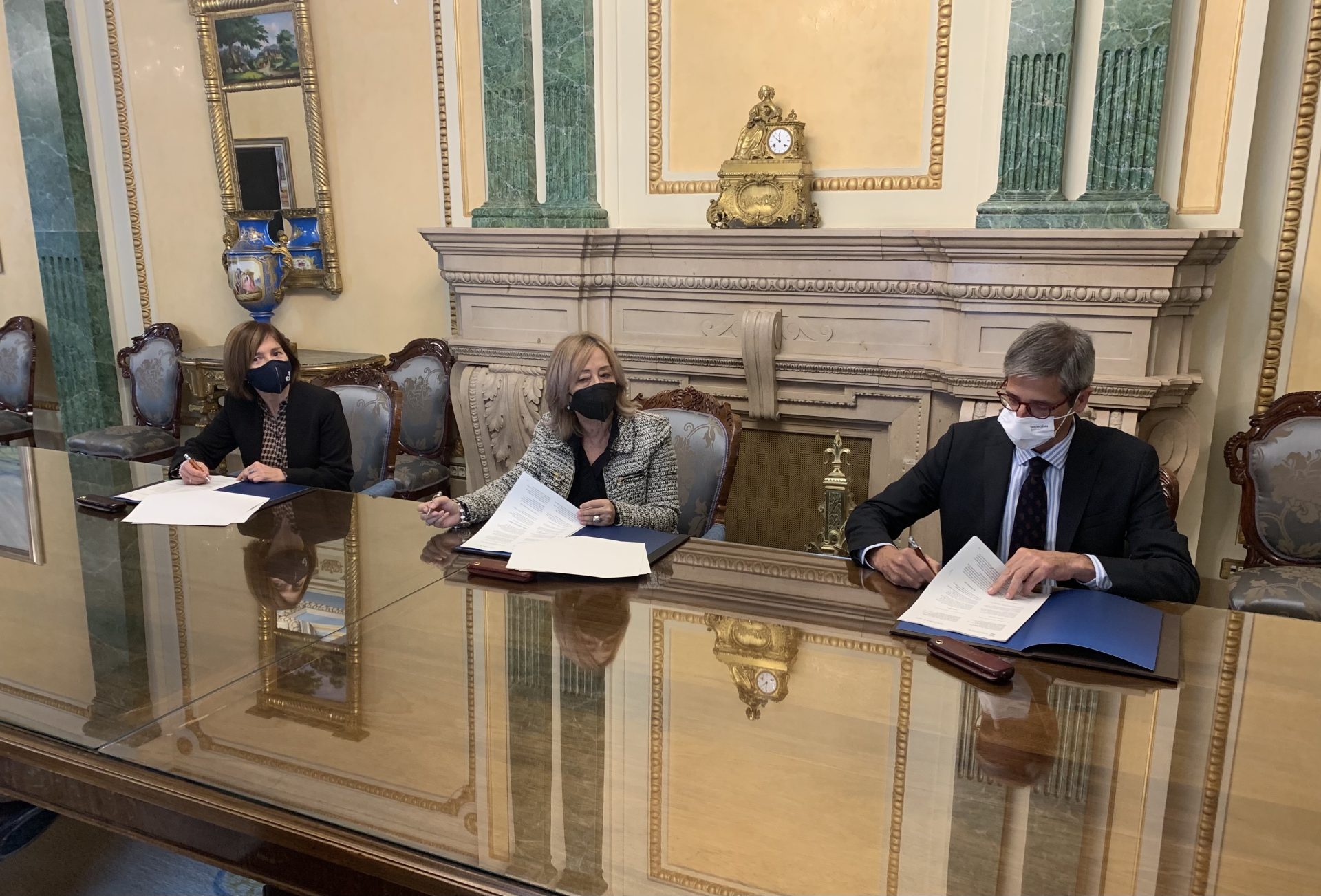- The provincial council will invest €1.3m in funding between 2021 and 2023 for this new centre, which will be situated in Lascaray Building.
- One of the goals of this project is the specialisation in 3D printing for drugs and bioprinting technologies applied to the field of advanced pharmaceutical therapies.
Vitoria-Gasteiz, 3 November 2021. The Provincial Council of Alava, the University of the Basque Country (UPV/EHU) and TECNALIA research and technological development centre signed today the agreement by which the Council will support the Advance Pharma Development project. Thanks to this agreement, the Provincial Council will offer funding of €650,000 to each one of the stakeholders between 2021 and 2023.
The agreement was signed by Deputy General Councillor and Head for Economic Development, Innovation and Demographic Challenge of the Basque Government, Pilar García de Salazar; UPV/EHU's Vice-Chancellor for Research, Inma Arostegui; and TECNALIA’s Lab Services Director, José Luis Elejalde. Vice-Chancellor of the UPV/EHU's Alava Campus, Manoli Igartua; Managing Director of TECNALIA, Jesús Valero; and the project’s operations managers Dr Jose Luis Pedraz (Faculty of Pharmacy of the UPV/EHU) and Dr Eider Larrarte (TECNALIA) were also present.
Thanks to this agreement, the UPV/EHU and TECNALIA will be able to have the material resources and manpower they need to carry out the project efficiently. This year, 2021, new science equipment is being purchased, like a bioprinter, research staff are being hired and the labs at the Lascaray Ikergunea research centre on Alava Campus are being fitted out.
The headquarters for this project will be at Lascaray Building, on Alava Campus, at the UPV/EHU. The aim of the project is to effectively combine technological and scientific capabilities, in order to boost joint research in the field of 3D printing for drugs and bioprinting technologies applied to the field of advanced pharmaceutical therapies.
Oriented basic research and applied research will mainly be carried out at the research centre. As a starting point, research will focus on the following:
- 3D printing of new drugs
- Specific doses, shapes, sizes and release profiles for various clinical needs
- Drug dissolution
- Drug release
- Patient-centred therapy
- Personalised medicine
- Polymedication
- 3D printing of medical devices
- Embedded systems with active ingredients
- Personalised medical devices
- 3D bioprinting
- Search for and design of new biomaterials for bioinks
- Physical-chemical characterisation of bioinks
- Biological assessment of the bioinks that are developed
- Definition and optimisation of bioprinting variables
- Application of bioinks and 3D bioprinting processes in the fields of regenerative medicine and tissue engineering
It is important to mention that both TECNALIA and the NanoBioCel research group based in the UPV/EHU Faculty of Pharmacy have been collaborating over the past few decades, resulting in a project called Basque Pharma Labs 4.0, placing Alava at the forefront of this field. Thanks to the Provincial Council’s support, in 2018 this project was able to open new facilities at Alava Technology Park, which are the most advanced in Spain, and the number of highly qualified people on the team went from 25 to 40.
Both these initiatives are part of the “Nodo Farmacéutico Alavés”, which is one of the projects carried out by Basque Advanced Therapies (BAT), combining the lines of work on advanced therapies of four projects into one value proposal, looking for synergies and complementing elements that can help the Basque Country become a benchmark for healthcare. These therapies require a new industry with a value chain that is different from that of conventional pharmaceutics, as well as strong public-private collaboration.
BAT mobilises the entire Basque healthcare value chain, with four large business groups and 18 SMEs, six research and technology centres, six health assistance organisations, three health research institutes and two associations in the sector. Collaboration with other Spanish autonomous regions is also important, such as with Navarre and the other Basque provincial councils. BAT’s total investment amounts to €462m.

